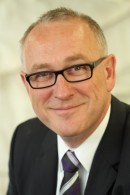Prof. Joachim Lenz Foundation
Short profile: Dr. Manfred Weisensee

Manfred Weisensee was born in 1959 in Friedberg, Hesse. He studied surveying at the Technical University of Berlin and the Technical University of Darmstadt from 1978 to 1984. From 1985 to 1997 he worked firstly as a software developer at Wild Heerbrugg AG in Switzerland, and then as a research assistant at the Technical University of Darmstadt in the Institute for Photogrammetry and Cartography. After earning his doctorate in 1992, he worked as an assistant professor in the field of cartography and as a lecturer in graphic data processing at Fraunhofer IGD. In 1997 he became professor for cartography and geoinformatics at Oldenburg University of Applied Sciences. There, he occupied multiple positions, including dean of the Surveying Department, member of the executive committee for central facilities at the university, and vice president for research and transfer, before he took on the position of president at Jade University of Applied Sciences in 2015. As well as working in academia and research, Dr. Weisensee is involved in a number of professional organisations. He is the scientific advisor for the Association of German Surveyors [Verband Deutscher Vermessungsingenieure] and has been president of the German Cartographic Society [Deutsche Gesellschaft für Kartographie und Geomatik] since 2011. Furthermore, he is a member of the foundation council for the Helga Ravenstein Cartography Foundation. He has said the following regarding his involvement in the Prof. Lenz Foundation: “The link between applied research and development, knowledge and technology transfer, international cooperation with our Eastern European neighbours, and the objective of youth exchange, is, in my opinion, the perfect constellation for promoting peaceful coexistence among people across the entire world, in freedom and in friendship. I myself very much benefited from how Germany and Europe developed peacefully after the war. No other generation up until then could enjoy the privilege of not having to live near an ongoing military conflict. And cross-border cooperation and exchange, first and foremost with our Western European neighbours, gave myself and a lot of other young people a new view of the world, and therefore a number of new professional prospects, not just in the sciences, but in other fields too.”
